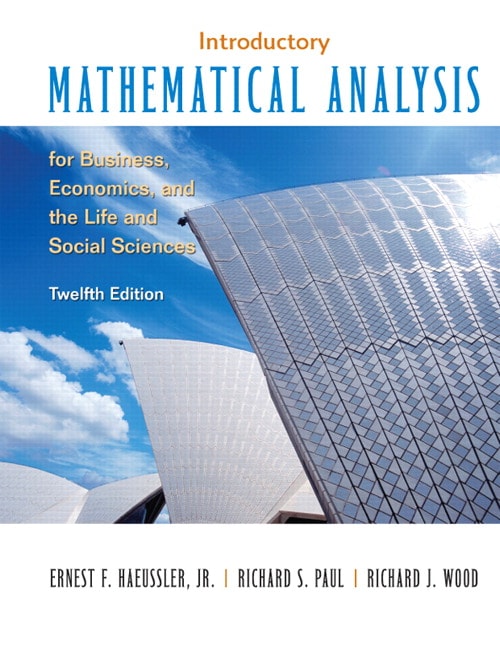
30.00$ - DOWNLOAD
- Digital File Direct & Fast Download ( Bank Exam ZIP & PDF) only for 30.00$
- All chapters are included in the test Bank Exam
- Free samples included once needed (ZIP & PDF)
- Multiple payment options (Paypal , Credit Card) - NO account Required
- Dedicated support / instant chat – Email - Whatsapp
- Digital file of Introductory Mathematical Analysis for Business, Economics and the Life and Social Sciences, 12th Edition for sale
Category : Higher Education
***THIS IS NOT THE ACTUAL BOOK. YOU ARE BUYING the Test Bank in e-version of the following book***
Each chapter concludes with a Review and a Mathematical Snapshot. Chapter 0 Review of Algebra 0.1 Sets of Real Numbers 0.2 Some Properties of Real Numbers 0.3 Exponents and Radicals 0.4 Operations with Algebraic Expressions 0.5 Factoring 0.6 Fractions 0.7 Equations, in Particular Linear Equations 0.8 Quadratic Equations Chapter 1 Applications and More Algebra 1.1 Applications of Equations 1.2 Linear Inequalities 1.3 Applications of Inequalities 1.4 Absolute Value 1.5 Summation Notation Chapter 2 Functions and Graphs 2.1 Functions 2.2 Special Functions 2.3 Combinations of Functions 2.4 Inverse Functions 2.5 Graphs in Rectangular Coordinates 2.6 Symmetry 2.7 Translations and Reflections Chapter 3 Lines, Parabolas, and Systems 3.1 Lines 3.2 Applications and Linear Functions 3.3 Quadratic Functions 3.4 Systems of Linear Equations 3.5 Nonlinear Systems 3.6 Applications of Systems of Equations Chapter 4 Exponential and Logarithmic Functions 4.1 Exponential Functions 4.2 Logarithmic Functions 4.3 Properties of Logarithms 4.4 Logarithmic and Exponential Equations Chapter 5 Mathematics of Finance 5.1 Compound Interest 5.2 Present Value 5.3 Interest Compounded Continuously 5.4 Annuities 5.5 Amortization of Loans Chapter 6 Matrix Algebra 6.1 Matrices 6.2 Matrix Addition and Scalar Multiplication 6.3 Matrix Multiplication 6.4 Solving Systems by Reducing Matrices 6.5 Solving Systems by Reducing Matrices (continued) 6.6 Inverses 6.7 Leontief's Input-Output Analysis Chapter 7 Linear Programming 7.1 Linear Inequalities in Two Variables 7.2 Linear Programming 7.3 Multiple Optimum Solutions 7.4 The Simplex Method 7.5 Degeneracy, Unbounded Solutions, and Multiple Solutions 7.6 Artificial Variables 7.7 Minimization 7.8 The Dual Chapter 8 Introduction to Probability and Statistics 8.1 Basic Counting Principle and Permutations 8.2 Combinations and Other Counting Principles 8.3 Sample Spaces and Events 8.4 Probability 8.5 Conditional Probability and Stochastic Processes 8.6 Independent Events 8.7 Bayes' Formula Chapter 9 Additional Topics in Probability 9.1 Discrete Random Variables and Expected Value 9.2 The Binomial Distribution 9.3 Markov Chains Chapter 10 Limits and Continuity 10.1 Limits 10.2 Limits (Continued) 10.3 Continuity 10.4 Continuity Applied to Inequalities Chapter 11 Differentiation 11.1 The Derivative 11.2 Rules for Differentiation 11.3 The Derivative as a Rate of Change 11.4 The Product Rule and the Quotient Rule 11.5 The Chain Rule and the Power Rule Chapter 12 Additional Differentiation Topics 12.1 Derivatives of Logarithmic Functions 12.2 Derivatives of Exponential Functions 12.3 Elasticity of Demand 12.4 Implicit Differentiation 12.5 Logarithmic Differentiation 12.6 Newton's Method 12.7 Higher Order Derivatives Chapter 13 Curve Sketching 13.1 Relative Extrema 13.2 Absolute Extrema on a Closed Interval 13.3 Concavity 13.4 The Second-Derivative Test 13.5 Asymptotes 13.6 Applied Maxima and Minima Chapter 14 Integration 14.1 Differentials 14.2 The Indefinite Integral 14.3 Integration with Initial Conditions 14.4 More Integration Formulas 14.5 Techniques of Integration 14.6 The Definite Integral 14.7 The Fundamental Theorem of Integral Calculus 14.8 Approximate Integration 14.9 Area 14.10 Area Between Curves 14.11 Consumers' and Producers' Surplus Chapter 15 Methods and Applications of Integration 15.1 Integration by Parts 15.2 Integration by Partial Fractions 15.3 Integration by Tables 15.4 Average Value of a Function 15.5 Differential Equations 15.6 More Applications of Differential Equations 15.7 Improper Integrals Chapter 16 Continuous Random Variables 16.1 Continuous Random Variables 16.2 The Normal Distribution 16.3 The Normal Approximation to the Binomial Distribution Chapter 17 Multivariable Calculus 17.1 Functions of Several Variables 17.2 Partial Derivatives 17.3 Applications of Partial Derivatives 17.4 Implicit Partial Differentiation 17.5 Higher-Order Partial Derivatives 17.6 The Chain Rule 17.7 Maxima and Minima for Functions of Two Variables 17.8 Lagrange Multipliers 17.9 Lines of Regression 17.10 Multiple Integrals Appendix A Compound Interest Tables Appendix B Table of Selected Integrals Appendix C Areas Under the Standard Normal Curve Answers to Odd-Numbered Problems Index Table of Contents
Manual solution Introductory Mathematical Analysis for Business, Economics and the Life and Social Sciences, 12th Edition for sale , Introductory Mathematical Analysis for Business, Economics and the Life and Social Sciences, 12th Edition for sale , Introductory Mathematical Analysis for Business, Economics and the Life and Social Sciences, 12th Edition pdf for sale , Ernest F. Haeussler, Penn State University Richard S. Paul, Penn State University Richard J. Wood, Penn State University


0 commentaires:
Enregistrer un commentaire